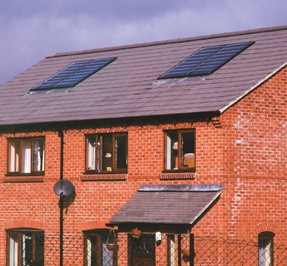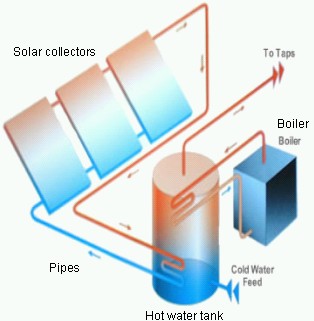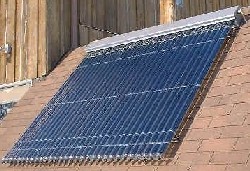 |
What
is Solar Hot Water (SHW) technology?
Active
Solar Heating technology means using the solar radiation for heating water.
Thus, the abundant free energy from the sun can be harnessed to meet part
of the domestic hot water demand and reduce the consumption of conventional
fuel, which causes climate change and pollution.
The UK receives vast amounts of solar energy which on average equals 60% of the annual amount received on the equator. The available range of high quality products enables householders to make effective use of the Sun. Thus, even in the spring and autumn and on clear winter days the solar hot water system can be useful.
The systems consist of solar collectors, a preheat tank (optional), a pump, a control unit, connecting pipes, the normal hot water tank (or a replacement tank from £250), and a conventional heat source (a standard solar system in the UK cannot provide enough heat to supply hot water at the desired temperature, throughout the year). Solar Hot Water systems will typically convert 40 to 50% of the solar energy falling on the solar collectors into useful heated water.
| Are
SHW systems suitable for domestic use? SHW technology is ideally suited to use on residential buildings, providing hot water. The use of active solar heating in households has grown substantially in the UK over the last few years, with many examples already in operation (see photo). SHW systems can be incorporated into buildings in various ways. Sloping rooftops are an ideal site, where collectors can simply be mounted using frames. Systems can also be incorporated into the actual building/roof fabric. In most SHW systems, only the collectors are visible. They look similar to dark roof lights. The overall area of the collector array may be typically 3-4 square metres. |
 |
|
The principle is straight forward. When the sun is shining, water is pumped through the solar panel and is heated by solar energy. This heated water then flows through a heat exchanger, warming the water stored in the hot water cylinder. If necessary, a boiler provides top-up heating. An electronic controller constantly compares the temperature of the solar collectors with the temperature of the water in the cylinder. Whenever the collectors are hotter than the cylinder, the controller switches on the system's circulating pump. A mixture of antifreeze and water is then circulated through the collectors and the cylinder's heat exchanger, heating the cylinder in just the same way as a central heating boiler. In the summer the water in the cylinder can reach a temperature of 80 deg C within half a day, and the insulation on the cylinder will keep the water warm for the next day. Typically the solar hot water system will reduce your domestic hot water bill by 50%. |
Where
to put an SHW system?
A house roof is ideal for installing an SHW system - there is plenty
of ‘unused’ space, the visual intrusion is minimal, and direct
exposure to sun light is the greatest. Roof conditions of course vary and
several key factors should be taken into consideration when assessing the
solar potential of your home:


